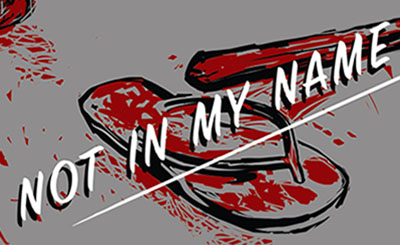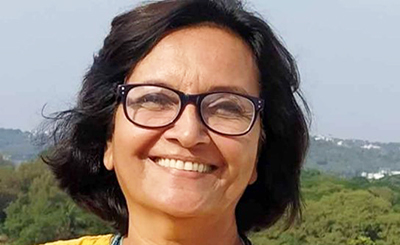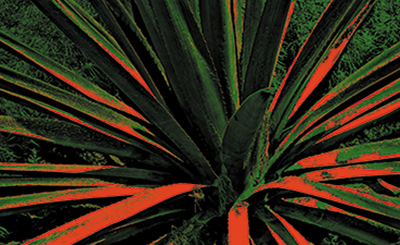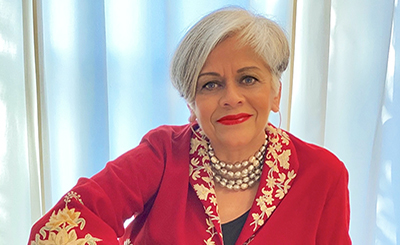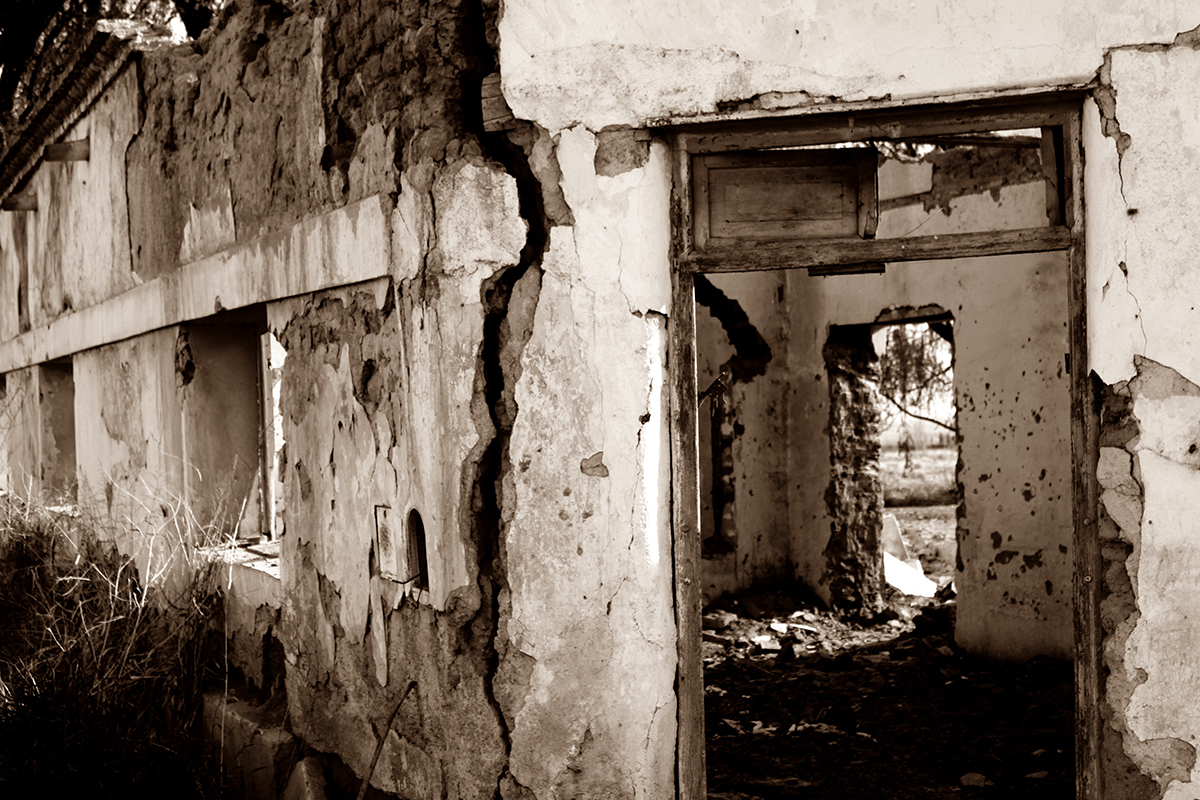
Register of Eliminated Villages
I have a register which lists 397 eliminated villages, Kurdish villages in northern
Iraq…. The work is called “The Register of Eliminated Villages.” It’s a very
decorative, pretty thing . . .
-Kanan Makiya, Frontline
Somewhere in this insomniac night
my life is beginning
without me. In Northern Iraq,
it is high noon, the sun there
perched over fields shriven
with lilies, the petals of orange
poppies red with a light
that a gauze of gray sparrows
glides through over sheaves
of bone too stubborn to burn,
all that is left of those razed
towns. A mother turns to a father
in the cold room they share,
offers her hands to his spine.
I curl inside her, a silver bangle
illuminated by candle’s
flame. I curl beside you, lay
my head close to the vellum
of your smooth back and try
again to sleep. Count to one
thousand, you suggest. Count to two.
Three. As someone must count
hacked date trees, hollowed
hills paved into gardens, though
the scholar on tonight’s
Frontline only counted each
town destroyed: three
hundred ninety-seven of them.
Who counts dolls, hand-
stitched, facedown in dirt?
stitched, facedown in dirt?
Count to four. Five. Six. Count
cadaver, stone, belongings: pots,
spun from red clay. Who
will count the amputated
hands of thieves? A mother
presses a hand to me. Inside
her, I thrash, a stalk of wheat
blistered by storm. Sleep comes,
brief as it is bright. I startle
awake, turn to you. The register,
I know, is real,
fat with the names of the dead,
elegant strokes of sharp pencil
etched into thick pages. A father
presses an ear to a mother’s
belly. I am wide awake. Count
to seven. Eight. Nine. You
murmur, turn to me. Someone
must be counting hours
spent weaving lace the color
of moonlight for a girl’s
dowry. But I don’t have
the right to count hours,
girls, dowries — just the skin-
thin pages of the good book
thin pages of the good book
I once cut a hollow into,
condoms I stored there,
cigarettes. Count each minute
I waited for them to fall
asleep. Count nights I sat alone
on the curb, held smoke
inside my mouth, released
whorls of it into the air.
A father leaves a mother asleep
on her side, the crocus
of my fetus nestled inside.
I draw over us the thin
sheet. A father reaches
for the Qur’an, thumbs through
page after illuminated page,
runs his finger beneath
each line of verse, looks everywhere
for the promise of my name
Self-Portrait As Mango
She says, Your English is great! How long have you been in our country?
I say, Suck on a mango, bitch, since that’s all you think I eat anyway. Mangoes
are what margins like me know everything about, right? Doesn’t
a mango just win spelling bees and kiss white boys? Isn’t a mango
a placeholder in a poem folded with burkas? But this one,
the one I’m going to slice and serve down her throat, is a mango
that remembers jungles jagged with insects, the river’s darker thirst.
This mango was cut down by a scythe that beheads soldiers, mango
that taunts and suns itself into a hard-palmed fist only a few months
per year, fattens while blood stains green ponds. Why use a mango
to beat her perplexed? Why not a coconut? Because this “exotic” fruit
won’t be cracked open to reveal whiteness to you. This mango
isn’t alien just because of its gold-green bloodline. I know
I’m worth waiting for. I want to be kneaded for ripeness. Mango:
my own sunset-skinned heart waiting to be held and peeled, mango
I suck open with teeth. Tappai! This is the only way to eat a mango.
West Texas Nocturne
Because the sky burned, I had to unhinge
from the window the mesh screen
to step out onto the roof where the world was
an orange freshly peeled. I held
to my nose fingertips scented with spring.
Beside me fluttered the wings
of another promise I made but didn’t keep.
I sat there for hours until my thighs
were raw, ripped by those rough shingles.
I knew how to perform under the gun,
to tether myself farther and farther afield.
This was before the other daughter
died and only one of us cried, but long after
those old pumpjacks no longer
needled the horizon clean. The velvet mat stayed
unfolded, but I told y’all I prayed
anyway. The sky was famished with stars.
I couldn’t help but count each scorched one.
Before The Accident, And After
I promise to lose weight was a lie
I told in every register I knew, until
the night the wind blew backward,
and exactly seven yellow poppies grew
from the mouth of her corpse I tried
to cuddle. I then began to count
the number of times my insomniac
friend said the word tomorrow,
the number of years any cactus
outlasted my sister, pound after pound
of the weight I lost then gained—
my gravy-thick horror.
My piles of chicken-bone sorrow.
I tried to stop missing my little sister
so I could better love my pretty mother,
shadows engraved in the secrets
of her wedding bangles. But no one wanted
to kiss me, and it doesn’t matter. Fat
is a silver vessel that holds holy water.
I was fat before the accident, and fat after.
What This Elegy Wants
It doesn’t want a handful of puffed rice
tossed with mustard oil and chopped chilies,
but wants to understand why a firefly
flares off then on, wants another throatful
or three of whiskey. This elegy is trying
hard to understand how we all become
corpses, but I’m trying to understand
permanence, because this elegy wants
to be the streetlamp above me that darkens
as sudden as a child who, in death, remains
a child. Somewhere, there is a man meant
for me, or maybe just to fall asleep beside me.
Across two oceans, there is a world where
I thought I could live without grief. There,
I watched a vendor reach with hands of lace
towards a woman who looked like me. There,
I fingered bolts of satin I never meant to buy.
There, no one said her name. How to look
into the abyss without leaning forward? How
to gather the morning’s flustered shadows
into a river? Tonight, I will watch a man I still
love walk past, hefting another woman’s child.
He doesn’t look at me. I won’t wonder if I
wanted him to. This elegy wonders why
it’s so hard to say, I always miss you. Wait,
she might have said. But didn’t you want
your palms to be coated in mustard oil? Did you
really want to forget the damp scent of my grave?
(Excerpted from Registers of Illuminated Villages: Poems, published by Gray Wolf Press)
More from The Byword
Comments
*Comments will be moderated





